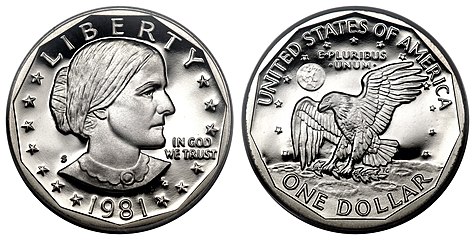Susan B. Anthony dollar
| United States | |
| Value | 1 U.S. dollar |
|---|---|
| Mass | 8.1 g (0.260 troy oz) |
| Diameter | 26.5 mm (1.04 in) |
| Edge | Reeded |
| Composition | .75 copper, .25 nickel, clad to pure copper core. |
| Years of minting | 1979–1981, 1999 |
| Mint marks | P (Philadelphia Mint) D (Denver Mint) S (San Francisco Mint) |
| Obverse | |
|
|
|
| The obverse of a proof Susan B. Anthony dollar | |
| Design | Right-facing profile of Susan B. Anthony |
| Designer | Frank Gasparro |
| Design date | 1979 |
| Reverse | |
|
|
|
| The reverse of a proof Susan B. Anthony dollar | |
| Design | An eagle clutching a laurel branch in its talons, displayed over a landscape of the Moon. |
| Designer | Frank Gasparro |
| Design date | 1971 |
The Susan B. Anthony dollar was a United States dollar coin minted from 1979 to 1981, when the series was suspended due to poor public acceptance, and again in 1999. Proposed as a smaller replacement for the cumbersome Eisenhower dollar, several shapes and compositions were tested, but all were opposed by the vending machine industry, a powerful lobby affecting coin legislation. Finally, a round planchet with an eleven-sided inner border was chosen for the smaller dollar.
The original design depicted an allegorical representation of Liberty on the obverse and a soaring eagle on the reverse but organizations and individuals in Congress called for the coin to depict a real woman. Several proposals were submitted, and social reformer Susan B. Anthony was selected as the design subject. The reverse design of the Eisenhower dollar was kept. Both sides of the coin were designed by Frank Gasparro, the Chief Engraver of the United States Mint.
The Mint struck 500 million coins in anticipation of considerable public demand, but the Susan B. Anthony dollar was poorly received, in part because of confusion caused by its similarity in size and metallic composition to the quarter. Despite its poor reception, the coins began seeing use in vending machines and mass transit systems, gradually depleting the surplus. In 1997, Congress passed a law authorizing the mintage of a new gold-colored one dollar coin depicting Sacagawea, but production did not begin quickly enough to meet demand. To fill the gap, the Susan B. Anthony dollar was struck again in 1999; the series was retired the following year.
Special coins for sale to collectors were struck in proof finish through the run of the Susan B. Anthony dollar, and some minting varieties are valuable to collectors. However, most circulation strikes remained in government stockpiles for years after minting, so many are available in uncirculated grades, and the premium over face value is minimal.
...
Wikipedia

